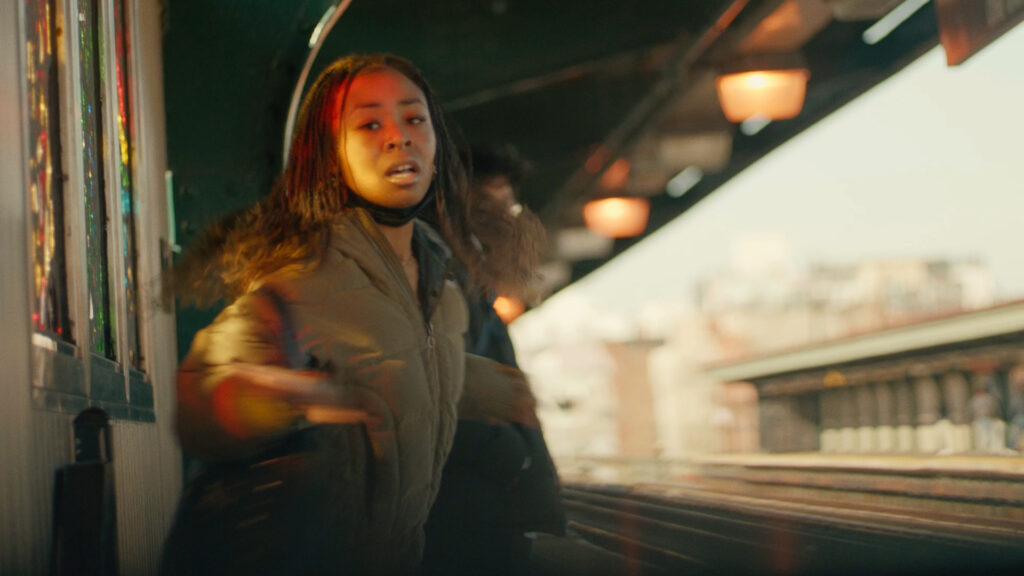Aisha Amin’s “Simone” is one of those efficient short films that tells you a lot about a person just by showing you a few minutes into a day in their life. Simone (Cree McClellan) is presumably a single mother to an infant. She has two needs at the moment we meet her: To land a new job and to get her kid to daycare on time. She loves her kid. Loves playing with him, loves dressing him, loves making him laugh. She comes off as someone who will always be a great mother. She remains focused on the simple, daily task of getting them on the train and to their usual destination. Then the phone rings and now her focus has to shift toward making a good impression for the potential new job.
I will stop describing the story right there. It would be unfair to you to continue.
Amin’s assured direction and McClellan’s commanding performance helps make “Simone” not just a slice-of-life bit of verite filmmaking, but also an edge-of-your-seat, high-stakes drama where the unthinkable happens, but can happen to anyone. There are many ways this could have ended, and I have a feeling another filmmaker would have opted for something bleaker and more ambiguous (still a flavor that many young filmmakers indulge in, but one that gets old pretty quick when watching a bunch of these in a row). Amin prefers an actual arrival, one that tells us just enough without us needing to know more.
Who knows why a short film like this can have a lasting impression when it doesn’t feel hugely ambitious? It’s a modest production, but I’ve been thinking a lot about Simone’s predicament since I watched the film. I hope she got the job. I hope everyone’s healthy. So many short films I watch for this piece try to force me into a conversation with myself that I’m not interested in having. “Simone” feels like it comes from a real place, one that wants to be shared, not out of a need to be great, but out of love for its characters. That’s its own greatness and Amin and McClellan earn it.

Q&A with writer/director Aisha Amin
How did this come about?
This short film was a collaboration between myself and Cree, the main actress who plays Simone in the film. It’s very much a retelling of her own experiences as a single mother in New York. I told her I wanted to honor her experience in a way that felt real and authentic, but also was more stylized than a traditional documentary form. Cree and I developed ideas for the script together and built the foundation of the story off her own real lived experiences. More so, as a director most of my films are shot, developed and conceptualized in New York City, my hometown. I was interested in the architecture of public transit in New York and thinking about who it is made for and who is excluded from using it. How can a mother navigate this architecture that is in direct conflict with her ease and comfort?
I love that it was shot on film. What went into that decision?
The film is actually shot on both digital and film. I wanted to use 16mm film for very specific scenes in the short film—the opening scene and the final scene after Simone and her baby are reunited on the train. To me, the 16mm acted as a new lens with which to view the film and to enter Simone’s head. We see her looking directly at us (her mirror) in the opening scene. This is shot on film to give it a dreamy and unique feeling. Same with those shots on the train at the end. The film gave me this great opportunity to elevate those scenes, to bring them out of real time and into dream and subconscious time.
How did you find Cree McClellan and Muzari?
Cree is an old friend and a fellow New Yorker. She is a fantastic actress, singer and performer in her own right and comes from a family of artists. Collaborating with her was an honor and a privilege and I hope to do it again! Her son Muzari is three years old now and in my personal opinion, has the potential to have a serious and amazing career in the entertainment industry!
What’s the biggest challenge in working with a baby?
Being on baby time is the biggest challenge. When you’re developing a schedule for a film, you typically have 10-12 hours of time you can massage and maneuver. When you’re working with an infant as young as Muzari was, you have to cater everything in the schedule to his daily routine. That includes nap time, lunch time, another nap time, clothes and diaper changes and an early bedtime. Essentially, the whole crew was on baby time. I will say having Cree, Muzari’s actual mother, on set with him at all times was super helpful.
Because of your direction and writing and McClellan’s performance, I feel like I know a lot about Simone even though there are few details given. How did you both go about developing the character?
That was always the intention, even before I wrote the actual script. This, in my mind, is a personal essay film. It is a portrait of a young woman and at times, we are watching her and at other times, we are her. I achieved this closeness to Simone by making Cree play a version of herself. We talked about who Simone was, why she does the things she does, and we developed a pretty profound backstory for her. When an actor feels closeness to their character, I think that authentic closeness just naturally follows.
What’s next for you?
I have another short film titled “Rumi” that just finished and will hopefully be released to the world very soon. I am working on a feature length screenplay and also planning on developing Simone into a feature length film.












